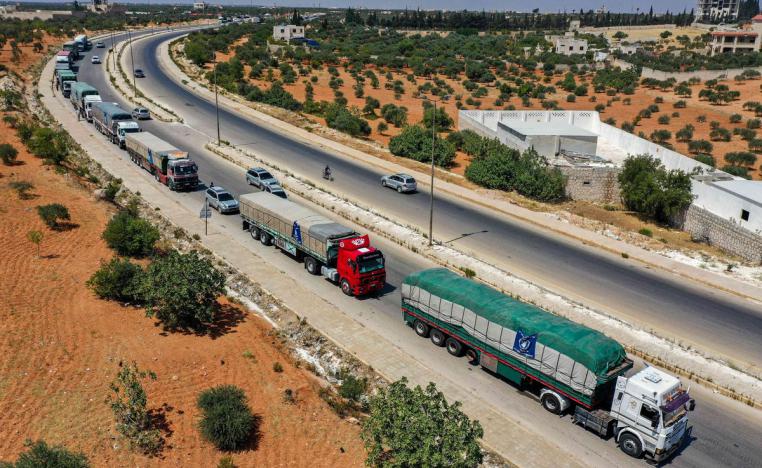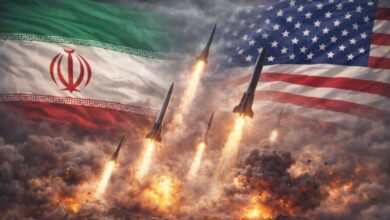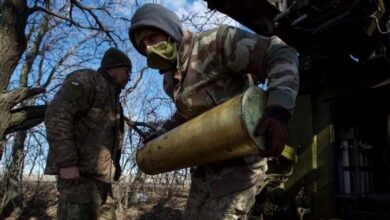UN calls for abandoning politics, expediting aid to Syria

The United Nations demanded on Wednesday to “put politics aside” and facilitate the delivery of aid to the areas affected by the earthquake in northwest Syria, a senior UN official said, while sources reported that an aid convoy has already entered the affected areas in north Syria through al-Hawa crossing for the first time since the earthquake. The horrific incident raised questions about how the West deals with the Syrian regime in such humanitarian events, which require urgent intervention to rescue civilians in the affected areas.
“My appeal is.. Put politics aside and let’s do our humanitarian work,” he said, stressing that “we cannot afford to wait and negotiate. As we negotiate, it’s the order of the day.”
“We need full access and support to reach” northwest Syria, he said, referring to areas under the control of jihadist and opposition factions in and around Idlib that have been severely damaged by the earthquake that struck Syria and its epicenter neighboring Turkey.
The United States has expressed its readiness to send aid to northwest Syria, but without going through the regime of President Bashar Assad. Damascus has issued a formal request to the European Union to help it deal with the natural disaster and rescue those trapped under the rubble of destroyed buildings.
“Humanitarian aid destined for northwest Syria is normally transported from Turkey through Bab al-Hawa, the only crossing point guaranteed by a UN Security Council resolution.” “But the roads to the crossing were damaged by the earthquake, temporarily affecting the UN’s ability to use it.”
The devastating earthquake killed more than 12,000 people in the two countries, including 2,992 in Syria, but the final tally was not announced until Wednesday evening.
“Aid has not been sent from inside Syria for nearly three weeks, the official said, warning that UN stocks could feed 100,000 people for one week.”
“Once they’re depleted, we need to renew them and that’s my appeal,” he said.
“The destruction in Aleppo, Homs, Latakia and other areas and in the countryside of these provinces is huge, but we also know that the destruction in the northwest is huge and we have to get there to assess it,” he said.
We need the support of the parties concerned to facilitate access both to northwest Syria and to the rest of the country because they are also suffering there,” he said, adding that their needs “cannot be ignored.
The United Nations said Tuesday that aid deliveries from Turkey to opposition-held areas of Syria through the only way it can be used have been affected by the earthquake.
However, the UN regional coordinator for Syria said on Wednesday he hoped to resume delivering aid tomorrow.
A UN convoy carrying humanitarian aid entered Syria on Thursday from the Bab al-Hawa border crossing with Turkey for the first time since the devastating earthquake, an official at a border crossing said.
Two aid sources said earlier that a convoy of six trucks was waiting to cross to reach northwestern Syria, while a Turkish official said the Bab al-Hawa border crossing was open for humanitarian aid and that authorities would open a few more in two days if the security situation were good.
“Fortunately today we hear that the road is open, we hope to have access to the border,” said Muhannad Hadi, the UN regional humanitarian coordinator for Syria, adding that the UN is cooperating with the Turkish authorities.
“We hope tomorrow we will be able to deliver something and cross the border,” he said at a press conference, adding that the trucks were ready to leave if necessary.
But he cautioned against some ambiguity on the Syrian side, noting that information was “difficult to verify.”
Since 2011, the Syrian conflict has claimed nearly half a million lives and forced nearly half the population from their homes, forcing many to head to Turkey.
Even before Monday’s earthquake, the majority of the population was in need of humanitarian assistance, and the latest catastrophe overshadowed the others.
“There is not enough search and rescue equipment, there is not enough medical equipment, there are not enough medicines,” he said.












